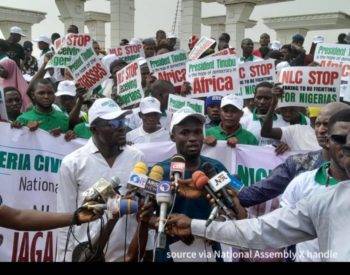The National Labour Congress (NLC) has intensified pressure on the Secretariat of Labour Party, issuing a resounding call for the resignation of National Chairman Julius Abure. The demand stems from growing concerns over Abure’s stewardship of party affairs, with the NLC highlighting several areas of discontent. This move by the NLC underscores a significant rift within the party, as members express dissatisfaction with the current leadership’s performance.
Julius Abure’s tenure as National Chairman has been marred by allegations of mismanagement and a failure to effectively address the needs and aspirations of party members. The National Labour Congress’s call for his resignation signals a crucial moment for the Labour Party, as it grapples with internal strife and mounting pressure to restore confidence among its ranks. As one of the key stakeholders within the party, the NLC’s stance reflects a broader sentiment within the Labour movement, emphasizing the need for accountability and transparency in leadership.
Leadership Crisis Threatens Labour Party’s Credibility
The call for Julius Abure’s resignation by the National Labour Congress underscores a deepening leadership crisis within the Labour Party, casting a shadow over its credibility and ability to fulfill its mandate effectively. The National Labour Congress’s decision to take such a decisive stance reflects widespread dissatisfaction among party members and stakeholders, who have grown increasingly disillusioned with the current state of affairs.
Amidst mounting pressure for reform, the Labour Party faces a pivotal moment in its history, with the fate of Julius Abure serving as a litmus test for the party’s commitment to accountability and good governance. Failure to address the underlying issues raised by the National Labour Congress could further erode trust in the party’s leadership and undermine its relevance in Nigeria’s political landscape.
Path Forward: National Labour Congress And Labour Party Must Prioritize Reconciliation and Reform
As the National Labour Congress calls for the resignation of National Chairman Julius Abure, the Labour Party finds itself at a crossroads, with the need for reconciliation and reform more pressing than ever. The party must heed the concerns raised by the National Labour Congress and embark on a path towards genuine accountability and inclusive leadership.
In order to restore confidence among its members and stakeholders, the Labour Party must undertake comprehensive reforms aimed at addressing the systemic issues that have plagued its leadership. This includes fostering greater transparency, promoting internal democracy, and prioritizing the interests of its constituents above personal agendas. By embracing these principles, the Labour Party can rebuild trust, strengthen its credibility, and emerge as a formidable force for progress and change in Nigeria’s political landscape.
The National Labour Congress’s call for the resignation of National Chairman Julius Abure signals a critical juncture for the Labour Party, highlighting the urgent need for reform and renewal. As the party navigates this challenging period, it must remain steadfast in its commitment to accountability, transparency, and the principles of social justice, in order to regain the trust and confidence of its members and the Nigerian people at large.
Internal Strife Erupts Within Labour Party
A wave of dissent has surged within Nigeria’s Labour Party, as discontented members orchestrate protests calling for the removal of National Chairman Julius Abure. The demonstrations highlight deep-rooted divisions within the party, diverting its focus from its essential role as an opposition force in Nigeria’s political landscape. The turmoil underscores the urgent need for internal reconciliation to reinvigorate the party’s purpose and effectiveness.
Disgruntled members argue that under Abure’s leadership, the Labour Party has strayed from its core principles and failed to fulfill its responsibilities as a viable opposition entity. This sentiment echoes concerns about the party’s dwindling influence and relevance within Nigeria’s political systems. As calls for Abure’s ouster intensify, the party’s leadership faces mounting pressure to address underlying grievances and restore unity among its ranks.
Peter Obi Urged to Lead Party Reorganization Efforts
In the wake of escalating internal discord, political figures such as Peter Obi are urged to spearhead efforts to reorganize the Labour Party and revitalize its standing in Nigerian politics. With his experience and credibility, Obi symbolizes a beacon of hope for disillusioned party members seeking meaningful reform and strategic direction.
Recognizing the urgency of the situation, Obi must galvanize support from within the party and mobilize resources to enact comprehensive restructuring measures. This includes fostering transparent communication channels, promoting intra-party dialogue, and fostering a cohesive vision that resonates with both party members and the broader electorate.
As the Labour Party navigates this critical juncture, the involvement of influential figures like Peter Obi could prove instrumental in charting a path forward that restores the party’s integrity and bolsters its capacity to effectively challenge Nigeria’s political status quo. Only through concerted efforts to address internal rifts and realign its objectives can the Labour Party reclaim its role as a formidable opposition force in the nation’s political arena.
Table of Contents
Discover more from OGM News NG
Subscribe to get the latest posts sent to your email.













